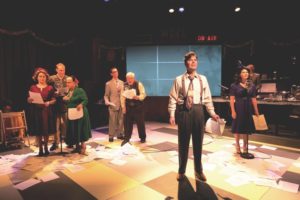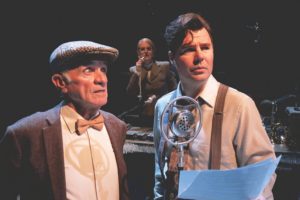The 1946 Frank Capra movie It’s a Wonderful Life is a touchstone of Americana. The title evokes thoughts of Christmas, moral reassurance and sentiment, small towns and loved ones, Jimmy Stewart and Donna Reed. George Bailey’s prayers, after all, are answered — a trope that’s usually reserved for Touched by an Angel.

But consider this quote from critic Andrew Sarris, who called It’s a Wonderful Life “one of the most profoundly pessimistic tales of human existence ever to achieve a lasting popularity.”
Sarris is right. Despite Capra’s relentless working-class populism, and the powerful nature of his happy endings, he presents in George Bailey a strain of deep postwar despair. Bailey wants to rise out of poverty, out of rural isolation, out of a life of sacrifice. He hopes to travel abroad, go to college and make something of himself. Instead, as his life is reviewed by God and the angel Clarence, all George’s hopes are crushed, one by one. And that’s the secret to Capra’s success with sentiment: in order to make a happy ending truly happy, you have to recover from the lowest state of hopelessness. Let’s not forget that It’s a Wonderful Life is the story of a man about to commit suicide. A heavenly intervention, and a what-if vision of life without Bailey — not unlike A Christmas Carol — is the catalyst to Bailey’s renewed faith. But there’s no covering up the fact that the world can be a miserable place.
In a brilliant feat of programming, the Provincetown Theater and artistic director David Drake have brought It’s a Wonderful Life to its stage in the form of a period broadcast — Joe Landry’s adaptation of the movie into It’s a Wonderful Life: A Live Radio Play. As a holiday offering in 2019, it’s perfect. It’s set in the studio of radio station WBFR in Manhattan, the actors introduced as actors playing characters, and the corny and awkward aspects of a 1940s movie are played for laughs. The audience has a role as well, clapping when the applause sign lights up, and everything from the commercials with oh-so-silly jingles to the sound effects performed by a live Foley artist make the experience feel a shade satirical, meta and fresh.
Drake’s direction, however, takes things a step further. He gives the proceedings a well-rehearsed, professional gloss: the cast of talented locals deliver their lines with expert comic timing and — even more impressive — genuine pathos. The laughs take the pressure off whatever is dated in the story (the courtship of George and Mary, the role of women), but to get through that and find true empathy for the characters is something of a holiday miracle. As George, Beau Jackett is extraordinary. He’s played musical leads in many a Cape production, but his performance here is an ideal mix of radio-play cartoonishness and, especially during George’s breakdown, restrained intensity.

The whole ensemble of nine other actors playing multiple characters is superb — shifting voices and stances between roles with precision, never pushing the humor too hard. Racine Oxtoby is a standout, capturing just the right tone as the vampy Violet Bick; Laura Cappello as Mary is a lovely foil for George. Julia Salinger plays Mrs. Bailey, Mrs. Hatch, and other matronly townspeople and gives them all a delightful shtick. Nicholas Dorr is a smooth Joseph and a raspy Mr. Potter, the town’s oligarch and the story’s only heavy. Paul E. Halley gets Freddie Filmore’s mellifluous radio announcer routine down pat. Anne Stott plays the Foley artist like a jazz musician, and Ken Lonergan gives the angel Clarence a winking innocence. Colin Delaney and Alex Juchniewich handle a motley crew of Bedford Falls characters with ease and charm. The cast is such a well-oiled machine, it’s a shame that the production runs only through Dec. 8.
Ellen Rousseau’s set and video projections are a visual treat — Rousseau, who’s the house’s resident scenic designer, seems incapable of misjudgment. From the checkerboard floor to the retro-studio props, the proportions are just right — open and expansive yet cozy, nostalgic with a touch of fantasy. The period costumes (Carol Sherry) and lighting (John Salutz) are warm and attractive.
This Provincetown Theater production, a bit lower profile than the company’s summer fare, never feels compromised for being community theater. Director Drake exploits the resources available to him to the fullest and always manages to elevate our expectations. His take on It’s a Wonderful Life is reminiscent of You Can’t Take It With You (also a Capra film), his first offering as artistic director in the spring of 2018 — Americana that feels right at home in Provincetown. It’s a holiday celebration with an Outer Cape edge.
Heaven Can Wait
The event: It’s a Wonderful Life: A Live Radio Play, adapted by Joe Landry from the Frank Capra film
The times: Thursday-Saturday at 7 p.m. (except Nov. 28), Sunday at 2 p.m., through Dec. 8
The place: Provincetown Theater, 238 Bradford St.
The cost: $35; $30 seniors and students; $20 children under 12; at provincetowntheater.org



